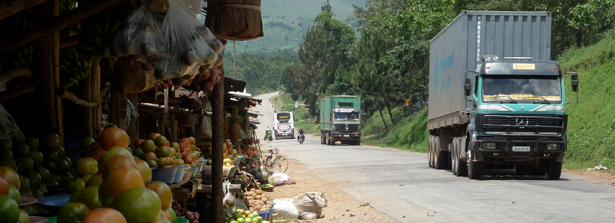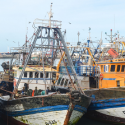Overview of stakeholders on regional trade for food security

The list presented here provides an overview of relevant actors that are involved in the development of regional markets for food and nutrition security in one way or another.
Please note that this is not an exhaustive list. Readers of this site are kindly invited to share suggestions for additional actors and networks that they think should be included.
CAADP – The Comprehensive Africa Agriculture Development Programme
CAADP aims to help African countries reach a higher path of economic growth through agriculture-led development. Through NEPAD, CAADP addresses policy and capacity issues across the entire agricultural sector and African continent. CAADP is entirely African-led and African-owned and represents African leaders’ collective vision for agriculture in Africa. CAADP has formed a joint action group with AU and NEPAD on regional trade. CAADP’s work falls under 4 pillars, two of which are relevant here:
- The objectives of Pillar 2 (Market Access) are to: Accelerate growth in the agricultural sector by raising the capacities of private entrepreneurs (including commercial and small-holder farmers) to meet the increasingly complex quality and logistic requirements of markets (re. selected agricultural commodities that offer the potential to raise rural (on- and off-farm) incomes). And to create the required regulatory and policy framework that would facilitate the emergence of regional economic spaces that would spur the expansion of regional trade and cross-country investments. Information on progress so far: Facilitation programmes are currently being funded in the COMESA and ECOWAS regions to promote the integration of regional markets and raise the competitiveness of local products in these markets.
- Pillar 3 (Food Security) also includes particular programmes that are of relevance for the debate on the role of regional trade for food security. E.g. Improved Regional Trade in Food Staples (RTFS), with start-up funding by the World Bank. This programme of work aims to assemble spatial evidence on existing regional production and trade in food staples and to develop predictive analytical tools that will enable spatial mapping of the outcomes resulting from common natural and policy shocks.
Caribbean Agriculture and Food Security Strategy
And the key stakeholders therein.
Dutch government
The Ministry of Foreign Affairs, together with other Ministries and government-related institutes, is engaged in several policies and programmes to support inclusive access to markets and an enabling business environment, and many of those have a particular regional dimension. A facility for regional trade has been created, amongst others, which focuses on agro-logistics, e-certification, the role of digital systems for quality processes, and which includes a number of pilot projects.
ECDPM – The European Centre for Development Policy Management
One of the four thematic priorities of ECDPM is promoting economic governance and trade for inclusive and sustainable growth. It supports the formation of a global economic system that fosters social equity, poverty alleviation and sustainable development, amongst others looking at regional integration. Its work plan 2014-2015 includes a “Regional and local markets for agricultural development and food security (Food Security programme)”.
FGG Alliance – Fair, Green and Global Alliance
MFSII alliance with BothEnds, SOMO, Transnational Institute (TNI), Action Aid, Clean Clothes Campaign. They have a special program related to trade and especially how international trade can frustrate the development of regional markets.
Food Commons
This particular initiative is part of an emerging trend. They describe the Food Commons model as a networked system of physical, financial and organizational infrastructure that allows new local and regional markets to operate efficiently, and small to mid-sized food enterprises to compete and thrive according to principles of sustainability, fairness, and public accountability.
IDH – The sustainable trade initiative
IDH focuses on up scaling sustainable trade initiatives for different commodities, primarily for the global market (NL/EU/etc) but with a growing interest in the regional dimension of value chains. A relevant question would be how international sustainable value chain processes foster or hamper opportunities at regional level.
IFPRI – International Food Policy Research Institute
IFPRI has a particular research area, into the particular role of regional trade agreements in food systems.
International and regional development banks
International and regional development banks, e.g. ASEAN
ITC – International Trade Centre
ITC is a knowledge centre in Geneva that works on trade issues also on regional trade in developing countries.
ODI – Overseas Development Institute
ODI is situated in London and works on trade, value chain development, and aid for trade.
Regional political and economic blocks
Some of the below regional trade related strategies of these blocks are explicitly supported by the Dutch government:
- East African Community works to facilitate trade, a/o forming a customs’ union and reducing non-tariff barriers (“Trademark East Africa”);
- ECOWAS works to promote regional trade to strengthen the agricultural production, and together with the World Customs Union, to strengthen capacities of customs’ services. It has got a regional programme and investment fund for agriculture and food security. The NL government explores possible linkages with the top sectors, e.g. inputs, horticulture, agro-food and logistics.
- The Food, Agriculture and Natural Resources (FANR) Directorate of the Southern African Development Community (SADC) Secretariat is tasked with the coordination and harmonisation of agricultural policies and programmes in the SADC region, in line with priorities in the Regional Indicative Strategic Development Plan (RISDP).
South Centre
The South Centre in Geneva does research on trade and its impact on developing countries with the purpose to inform trade negotiators from these countries.
The Framework for Action on Food Security in the Pacific
And the key stakeholders therein.
TMSA – TradeMark Southern Africa
TMSA supports the COMESA-EAC-SADC Tripartite to generate innovative approaches, practices and solutions to vexing regional integration questions e.g. the programmatic approach to regional transport network development; integrated management approaches to the functioning of border crossing problems; an electronic approach to non-tariff barrier identification and reporting for real-time solution; introducing new and revamped methodologies and approaches to measuring progress and success, particularly along transport corridors.
US Government
The US Government supports private sector engagement and investment in Africa through three Feed the Future – Africa Regional Trade Hubs.
For example, the West Africa Trade Hub and African Partners Network:






